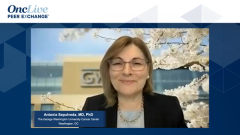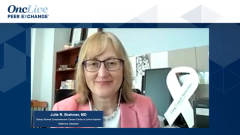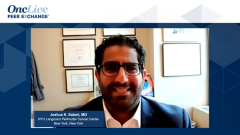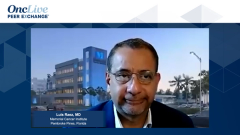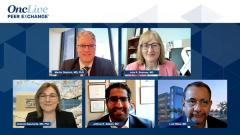
Emerging Targets in Non–Small Cell Lung Cancer
Julie R. Brahmer, MD, details emerging targets in non–small cell lung cancer and the outlook for the future of treatment.
Episodes in this series

Transcript:
Martin Dietrich, MD, PhD: Dr Brahmer, if you can give us a little bit of an outlook for the future of non–small cell lung cancer, about the additional opportunities, ADCs [antibody drug conjugates], is there new genomics on the horizon that may be helpful? Just an outlook from your perspective, how you would like to see the lung cancer field develop?
Julie R. Brahmer, MD: Sure. There continues to be excitement and more targets. Just to give you a quick story about NRG1 fusions. I had a patient who came in, had a very small panel, no RET fusion check. I talked with my colleagues, it’s like, it was a small panel that was sent out to a company. I said, “You’ve gotta send it to this other company so you can get a full fusion test.” And it came back and that person said, “Oh, she doesn’t have anything.” But I was like, “Oh, why don’t you send me the report, let me see the patient again.” And this patient was going to go on to hospice next. This patient had a NRG1 fusion. I sent her down the road to a colleague who had a trial of zenocutuzumab, which was a HER2/HER3 bispecific that has shown activity in this. She’s had a great response and she’s off oxygen. This really is important to be able to pick up. Yes, it’s rare. No, we don’t have an FDA-approved drug yet in this space, but I think it’s going to come.
I think that obviously HER2 mutations with trastuzumab deruxtecan, now that’s approved for use. We use that quite a bit in clinic. Now we also have a HER3 ADC, patritumab deruxtecan, that is showing some activity in EGFR TKI [tyrosine kinase inhibitor] pretreated patients. Potentially the new kid on the block that may be coming is the TROP-2 ADCs, where in non–small cell lung cancer, about 92%, almost 100%, of non–small cell lung cancers overexpress TROP-2, and datopotamab deruxtecan as well as other very similar ADCs are showing activity. Specifically, at least in a press release, datopotamab deruxtecan did increase PFS [progression-free survival] in TROPION-Lung01, and we hope to see that data in the fall, and the overall survival is pending. I think ADCs are here to stay. I do think these ADC drugs have their own toxicities that can be complicated to manage. But I think it’s all about giving our patients options, improving overall survival, and really changing the face of this disease. That, again, all relies on knowing the target and whether or not your patient’s disease overexpresses this, has a mutation or a targetable fusion.
Martin Dietrich, MD, PhD: I think that’s a wonderful summary. I do want to add one preclinical report that’s certainly not ready for practice that made me very excited and follows up on what Dr Sabari said earlier about basically going from suppressive therapies for oncogene-driven cancer into permanent solutions. We’ve had a report in [the Journal of Thoracic Oncology] about an ALK [anaplastic lymphoma kinase] epitope introduction as a sensitizer for immunotherapy. Those are preclinical models, still very, very early. But I thought there was a glimpse of hope for finding a way of making immunotherapy available to oncogene driven patients as well. So certainly, no lack of excitement in lung cancer space.
Transcript is AI-generated and edited for clarity and readability.


